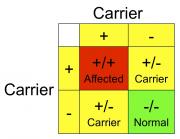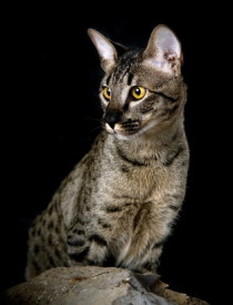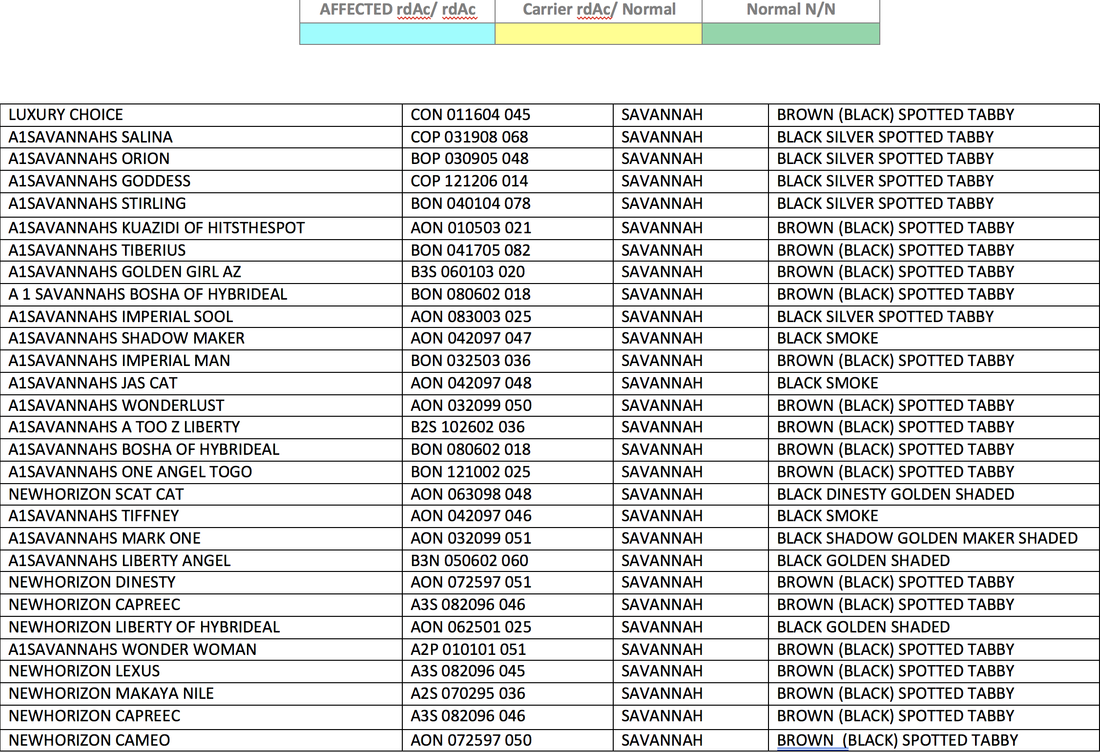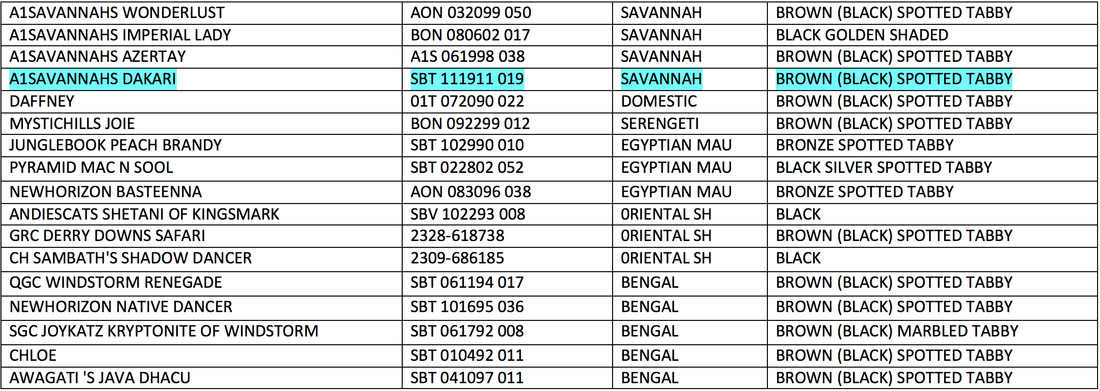 Recently, the discovery of the PRA-gene has been dicovered in a few cats within the Savannah breed. These cats are from A1Savannahs lines and are A1Savannahs cats with several cats in the ancestry which we, as breeders, are all likely to have in our pedigrees. The concern is that finding out where these cats are currently located to be able to test will be a collaborative nightmare between breeders and pet buyers. Some of the cats are even now deceased and unable to be tested. So what is PRA and why do we need to be concerned? PRA is the shortened version of the disease Progressive Retinal Atrophy and this gene means that a mutation, which is scientifically labelled as rdAc occurs in the CEP290 gene. This means that a deficient protein that is associated with progressive retinal atrophy (PRA) in the Abyssinian cat and related cats. Usually, clinical signs typically become evident between 8 and 20 weeks of age and the disease progresses so that by around one year of age complete retinal degeneration is apparent in most cats according to Ofri R, Reilly CM, Maggs DJ, et al. Characterization of an early-onset, autosomal recessive, progressive retinal degeneration in Bengal cats. Invest Ophthalmol Vis Sci. 2015;56:5299–5308. The problem is that this is not always the case as more research is being done, a lot older cats have the gene but haven't yet shown any signs of the disease. (Langfords Vets, UK) PRA is a disease which affected the sight of cats. The photo receptors start to deteriorate in the retina and affected cats develop 'late onset blindness'. This is usually detectable, I am advised by Langfords Vets, usually by 3 to 5 years of age. Worryingly though, it may not be detectable until they are aged 6 or older. The problem for many breeders who have retired and sold breeding cats at 2 or 3 years old is that some of the pet buyers are unknown to the breeder by the time the cat turns 7 (4 years later!) or if the cat shows any signs of blindness, the buyer often will not contact the breeder to let them know, leaving them blissfully unaware that there is a problem in the line. Some owners may also put sight deterioration down to old age, even though it is actually a defective gene which the cat possesses. It is very important to know that the age of disease onset and progression can be variable and some affected cats may not develop clinical signs, and eventually blindness, until later in life. Is this the same as PRA-B? PRA-B is the gene for the same disease which has been identified in the Bengal breed. You will often hear Bengal breeders saying "PRA-B Normal" in their cattery information or on their kitten adverts. This means they have screened their cats and are only using normal breeding cats in their programme. Langfords Vets gave me very detailed information about this disease on the 30th of January 2017. They stated that is works in exactly the same way as PK Deficiency (see here) and carriers should not be bred together which has recently happened, producing affected kittens. Important Point A lot of Savannah breeders are still in their infancy of their 'breeding career' (under 10 years) and so therefore, it is difficult to discern IF we have a major cause for concern within the breed or if it is something we can eradicate from a few lines within a few generations. How many cats are realistically affected and what do I do about it? By January 30th 2017, Langfords Veterinary Laboratories in the UK had performed tests on 309 Savannah Cats for PK Deficiency and a grand total of 0 (zero) tests were performed for PRA and 0 (zero) for PRA-B. They were happy for me to publish this data. I am currently awaiting UC Davis (University of California Laboratory) to respond to me with this data. They will now have all of our swabs to process, the first Savannah's in the UK to be tested, and can only identify certain markers or breed-specific problems if we all test for this defective gene. Breeds known to be currently affecting by PRA are: * Abyssinian * American Curl * American Wirehair * Balinese * Bengal * Colourpoint Shorthair * Cornish Rex * Javanese * Ocicat * Oriental Shorthair * Siamese * Singapura * Somali * Tonkinese We all have several of those breeds behind our Savannah's and then some....! Langfords advised me that as Bengal cats have such a heavy influence in the early lines (and some current) of the Savannah breed: "ALL Savannah breeding cats would definitely benefit from the PRA and PRA-B test. It's a simple swab and we can re-use DNA already stored on the system provided we have received the sample in the last two years". I would like to publish our data once it comes back for the testing carried out on our cattery and at present I am hoping that we have all normal cats. I will also publish the full list of the cats in the pedigree of the rdAc/rdAc (Affected) cat which has recently been discovered and is now in our possession. This is aiming to encourage all breeders with those cats in their pedigree to test as soon as physically possible to prevent any other kittens being produced as carriers or affected. So what do I do if my cat is positive or a carrier of PRA? Well, that it entirely at your own discretion but please be responsible for the sake of the breed and the animals. We found out about PRA in Savannah's after recently bringing in a male this month who has tested as "affected - rdAc/ rdAc - positive". We have not used him yet and what brings my concern is that he is an F6 SBT and has basically a whole pedigree of A1Savannah cats. So where did it come from? We all know that old A1Savannahs pedigrees aren't all true to word and may not even be the cats that are on them flowing through into current pedigrees on cats, or so I have heard through close relationships with breeders, so realistically we can't really be sure that we will know where it's come from. What we can do though, is we can work together to eradicate it before it does become an issue, especially something that takes years to show up in most cases. If you have a homozygous cat then it is AFFECTED = rdAc/ rdAc = Positive and will develop the disease at some point in their life. If you have a heterozygous cat then it is a CARRIER = rdAc / normal = Will not develop the disease but can pass on the gene. It should not be used for mating with another carrier as there is 25% chance of producing affected kittens and 50% chance of producing more carriers. If you have a normal cat then it does not have the gene. But the Savannah isn't related to the Abyssinian, Siamese or any other cats? Well, theoretically we don't actually know how many have been used, given that the first cat within the breed was actually a siamese mated to a serval for the first F1's. Another issue is that a lot of cats are registered as DSH (domestic shorthair) when they are in fact other breeds, to prevent knowledge of the actual outcross used. This was commonplace years ago when the breed was further developing. What does it mean for our Savannah cats? For many of us, it may mean nothing as you may have normal cats in your breeding programme. Some breeders may have carriers of the PRA gene but not be mating them to normal, therefore producing affected or positive kittens. What next? Result = Positive Option A: Neuter or spay the cat. Option B:
It is not advisable to knowingly bring a PRA Affected cat into your cattery. Result = Carrier (Heterozygous) or rdAc/Normal Option A: Neuter or spay the cat. Option B:
Result =Normal or Normal/Normal (N/N) Your cat does not have PRA and therefore is able to be bred from without worrying about PRA. It is advisable to check for PRA in any cats you use for breeding moving forward. A careful breeder is a wise breeder. Here are the cats which are contained within the pedigree of one known affected cat so any number of these cats could be the source of the PRA defective genes being passed on.
|
Welcome | Welkom | Ben arrivata | Velkomst | Tervetuloa | Bienvenue | 欢迎 | Willkommen |
ようこそ!| Sveiki | Добро пожаловат | Välkomna | Velkommen | ยินดีต้อนรับ | خوش آمدید | 환영 | AuthorAll about Stylisticat, written by Kayleigh McIntosh-Lowrie Archives
February 2021
Categories
All
|



 RSS Feed
RSS Feed
